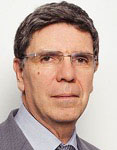Overview
[ Français ]
Bernard Derrida Aisenstadt Chair Lecture Series
École Normale Supérieure, Département de physique, France

Bernard Derrida will give a series of three lectures suring his visit to the Centre de recherches mathématiques for the Aisenstadt Chair.
The first two will take place in the workshop: Interacting Particle Systems and Hydrodynamic Limits in March 2022.The third one will take place in the workshop: Branching systems, reaction-diffusion equations and population models in May 2022.
First lecture:
Lecture intended for a wider audience and presented as part of the Quebec Mathematical Sciences Colloquium
Friday, March 18, 2022, 3:30 PM (on Zoom and on site)
Centre de recherches mathématiques
André-Aisensdadt Pavilion, Université de Montréal
Room 6214
(To get the Zoom link if you are not a participant of the March 14-25 workshop, please register here)
Title: The importance of large deviations in non-equilibrium systems
Abstract:
Statistical Physics allowed to unify, at the end of the 19th century, Newton's mechanics and thermodynamics. It gave a way to predict the amplitude of fluctuations around the physical laws which were known at that time. Einstein, in his very first works, showed that the measurement of these fluctuations allowed to estimate the size of atoms. His reasoning, which was at the origin of the linear response theory, applied to the black body gave one of the first evidences of the duality wave-particle in Quantum Mechanics. Statistical Physics gives also a framework to predict large deviations for systems at equilibrium. In the last two decades, major efforts were devoted to extend our understanding of the statistical laws of fluctuations and large deviations to non-equilibrium systems. This talk will try to present some of the recent progresses.
Second lecture:
Thursday, March 24, 2022, 11:40 a.m.
Centre de recherches mathématiques
Pavillon André-Aisensdadt, Université de Montréal
Room 6214
Title: Large deviation functions of the density and of the current for diffusive systems
Abstract:
After a short review of the different approaches used to determine the large deviation functions of diffusive systems in their steady state, the talk will present a few recent results: 1. How these large deviations functions are modified for weak contacts with the boundaries 2. What is the influence of conditioning on the current on these large deviation functions.
Third lecture:
Friday, May 13, 2022, 11:30 a.m.
Centre de recherches mathématiques
Pavillon André-Aisensdadt, Université de Montréal
Room 6214
Title: : Phase transitions on a tree in presence of disorder and growth-fragmentation models
Abstract:
A tree-like model based on a simple non-linear recursion on a tree exhibits a phase transition of infinite order. After a discussion of the precise nature of the singularity at the transition, and on the influence of the distribution of disorder, I will discuss some more recent results on the critical tree at the transition which can be viewed as a growth fragmentation model.
Biography:
Bernard Derrida is a French theoretical physicist, he is an expert in statistical mechanics who has adapted statistical-physics ideas to various problems in biology and is best known for his work in statistical mechanics, and is the eponym of Derrida plots, an analytical technique for characterizing differences between Boolean networks.
He passed the entrance examination for the École Normale Supérieure in 1971 and then the aggregation of physics in 1974 and obtained his doctorate in 1979.
In 1993, he became a university professor. He then taught at the Université Pierre et Marie Curie and at the ENS where he was part of the statistical physics laboratory.
Since 2015, he has held the Statistical Physics Chair at the Collège de France.
In 2010, Derrida was awarded the Ampère Prize in 2001 and the Boltzmann Medal by IUPAP with John Cardy and he was elected, in 2004 to the Académie des sciences.